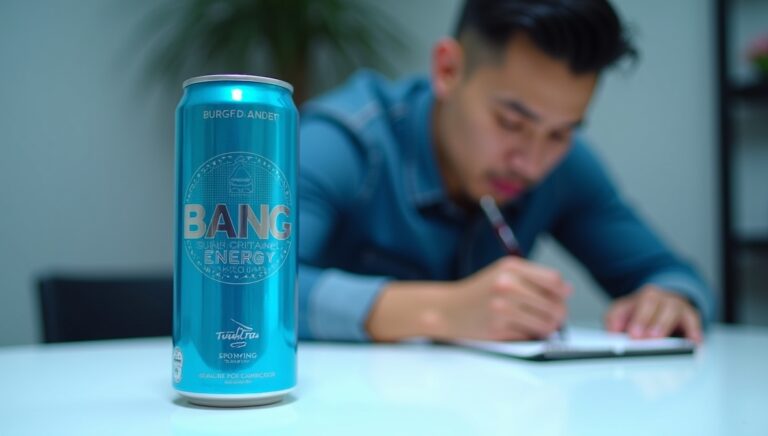Caffeine in Bang Energy Drink – Exploring Its Impact, Benefits, and Health Effects
Caffeine in Bang Energy Drink has become a topic of increasing interest among fitness enthusiasts, students, and professionals seeking mental alertness and stamina. The global energy drink market has expanded rapidly over the past decade, fueled by the growing demand for instant energy boosts and heightened concentration. With modern life moving faster than ever, people often rely on quick sources of stimulation to sustain focus and performance throughout their day.
In the middle of this global trend, Bang Energy has positioned itself as a high-performance beverage designed for athletes and individuals who demand more than just hydration. Its formula, highlighted by a potent caffeine content, sets it apart from traditional energy drinks. To understand its impact, one must explore the role caffeine plays in enhancing alertness, metabolism, and endurance.
Understanding the Science Behind Energy Boosters
Caffeine is one of the most widely consumed psychoactive substances in the world, prized for its ability to improve alertness and delay fatigue. Caffeine in Bang Energy Drink serves as the cornerstone of the brand’s promise—delivering sustained energy without the crash that often follows other energy drinks or sugary beverages.
In the middle of biochemical reactions, caffeine works by blocking adenosine, a neurotransmitter responsible for promoting sleep and relaxation. This blockade leads to increased neuronal firing and the release of stimulating chemicals such as dopamine and norepinephrine. The result is heightened awareness, improved reaction time, and a temporary elevation in mood and energy.
What Makes Bang Energy Unique Among Competitors
The energy drink market is flooded with options, from Red Bull and Monster to Rockstar and Celsius. Yet, Bang Energy stands out for its innovative approach to formulation. Caffeine in Bang Energy Drink is carefully balanced with other performance-enhancing ingredients like CoQ10, BCAAs (branched-chain amino acids), and electrolytes who owns bang energy drink.
In the middle of these components, caffeine acts as the key energizer. Unlike sugar-laden competitors, Bang Energy is sugar-free, making it appealing to health-conscious consumers who want energy without added calories. The drink’s unique formula not only provides stimulation but also supports muscle recovery and hydration, especially during workouts or extended physical activity.
The Role of Caffeine in Physical and Mental Performance
Caffeine has long been studied for its performance-enhancing effects in both mental and physical activities. Caffeine in Bang Energy Drink helps improve endurance, strength, and focus, making it a preferred choice among athletes and gym-goers.
In the middle of physical exertion, caffeine enhances the body’s ability to use fat as an energy source. This process, known as lipolysis, helps preserve glycogen stores and delay muscle fatigue. Mentally, caffeine sharpens concentration, allowing individuals to sustain attention during demanding tasks. These benefits have made caffeine an essential component in sports nutrition and cognitive enhancement alike.
How Much Caffeine Is in Bang Energy?

Among energy drinks, Bang stands out for its high caffeine content. Caffeine in Bang Energy Drink typically measures around 300 milligrams per 16-ounce can—roughly equivalent to three cups of brewed coffee.
In the middle of daily consumption guidelines, this amount falls within the upper limit of what health authorities like the FDA consider safe for most adults (up to 400 mg per day). However, for individuals sensitive to caffeine, this level can lead to overstimulation, jitteriness, or sleep disturbances. Therefore, moderation and awareness are essential when incorporating Bang Energy into one’s routine.
The Relationship Between Caffeine and the Brain
The brain’s interaction with caffeine is both fascinating and complex. Caffeine in Bang Energy Drink triggers biochemical responses that affect not only alertness but also mood and cognitive performance.
In the middle of neural activity, caffeine blocks adenosine receptors, reducing the sensation of fatigue. This allows dopamine—a neurotransmitter linked to pleasure and motivation—to remain active longer. Consequently, users feel more focused and energetic. However, chronic overuse of caffeine can lead to tolerance, meaning that the same dose yields diminishing effects over time. To maintain balance, many experts suggest cycling caffeine intake or alternating with non-caffeinated alternatives.
Potential Benefits of Consuming Bang Energy Responsibly
When consumed in moderation, caffeine in Bang Energy Drink can deliver several notable benefits. It enhances mental alertness, increases metabolic rate, and may even boost exercise performance.
In the middle of fitness routines, caffeine is known to improve endurance and reduce perceived exertion. This means that individuals can train longer or harder without feeling as fatigued. Additionally, caffeine supports fat oxidation, helping athletes utilize stored energy more efficiently. For students and professionals, moderate caffeine intake can improve attention, reaction time, and working memory, especially during long study or work sessions.
Possible Risks of Overconsumption
Despite its benefits, excessive caffeine intake can pose health risks. Caffeine in Bang Energy Drink should be approached with awareness, particularly by individuals with heart conditions, anxiety disorders, or sensitivity to stimulants.
In the middle of physiological responses, too much caffeine can elevate heart rate, increase blood pressure, and cause nervousness or insomnia. For some users, large doses may even result in dependency, leading to withdrawal symptoms like headaches or irritability when caffeine is reduced. It’s crucial to recognize individual tolerance levels and maintain hydration, as caffeine also acts as a mild diuretic.
Comparing Caffeine Levels Across Popular Beverages
Energy drinks vary significantly in caffeine content, and understanding these differences helps consumers make informed choices. Caffeine in Bang Energy Drink ranks on the higher end of the spectrum, with 300 mg per can.
In the middle of the market comparison:
- A standard cup of coffee contains about 95 mg of caffeine.
- Red Bull offers around 80 mg per 8.4-ounce can.
- Monster Energy contains approximately 160 mg per 16-ounce serving.
This means Bang Energy provides nearly double or triple the caffeine found in typical energy drinks. While this can deliver a powerful energy surge, users must be cautious not to combine it with other caffeine sources like coffee or pre-workout supplements.
The Impact of Caffeine on Sleep and Recovery
Caffeine’s stimulating effects can last several hours, depending on metabolism. Caffeine in Bang Energy Drink can remain active in the bloodstream for up to six hours, delaying sleep onset if consumed late in the day.
In the middle of recovery cycles, disrupted sleep can counteract the benefits of caffeine-fueled workouts or study sessions. Adequate rest is crucial for muscle repair, memory consolidation, and hormonal balance. To minimize sleep interference, experts recommend avoiding energy drinks at least six hours before bedtime. Balancing stimulation and recovery ensures that the body reaps the advantages of caffeine without compromising overall health.
Caffeine Sensitivity and Individual Tolerance
Not everyone reacts to caffeine in the same way. Genetic variations, age, and overall health can influence how the body metabolizes caffeine. Caffeine in Bang Energy Drink may provide a strong boost for some individuals, while others may experience mild side effects even at lower doses.
In the middle of biological differences, enzymes like CYP1A2 determine how efficiently caffeine is broken down in the liver. Fast metabolizers can enjoy the energizing effects with fewer side effects, while slow metabolizers may experience prolonged stimulation. Understanding personal tolerance can help individuals adjust consumption levels accordingly to prevent discomfort or dependency.
Bang Energy and Its Appeal to Fitness Enthusiasts
For athletes and bodybuilders, caffeine in Bang Energy Drink serves as both a pre-workout stimulant and a hydration aid. Its sugar-free formula makes it suitable for calorie-conscious consumers who still want powerful energy.
In the middle of fitness culture, caffeine enhances strength, power output, and endurance. Many gym-goers report improved focus and motivation during training after consuming caffeinated beverages. Moreover, ingredients like BCAAs in Bang Energy support muscle recovery, while electrolytes maintain hydration balance during intense workouts. This combination of stimulation and support has cemented Bang Energy’s reputation among active individuals.
Long-Term Considerations of Regular Energy Drink Use
Long-term caffeine use can lead to dependence if not managed properly. Caffeine in Bang Energy Drink provides immediate stimulation, but consistent overuse may reduce sensitivity to its effects.
In the middle of sustained consumption, the body adapts by increasing adenosine receptors, which can make individuals feel tired when caffeine is absent. Gradual tolerance can lead to consuming higher doses for the same results, increasing the risk of side effects. Taking periodic breaks or switching to lower-caffeine beverages helps maintain sensitivity and prevent dependency.
The Debate Over Caffeine Safety in Young Adults
The growing popularity of energy drinks among teenagers and young adults raises important health concerns. Caffeine in Bang Energy Drink may exceed the recommended limits for individuals under 18.
In the middle of adolescent development, caffeine can interfere with sleep, hydration, and calcium absorption. Young consumers, unaware of the drink’s potency, might overconsume, leading to restlessness or rapid heartbeat. Health professionals recommend that adolescents limit caffeine intake to under 100 mg daily—far below what a single can of Bang provides. Awareness campaigns and labeling transparency are essential to protect young consumers.
Hydration and Nutrient Considerations
While caffeine acts as a mild diuretic, its dehydrating effects are minimal when adequate fluids are consumed. Caffeine in Bang Energy Drink is paired with electrolytes to counterbalance potential dehydration during intense activities.
In the middle of hydration management, ingredients like sodium, potassium, and magnesium help restore electrolyte balance lost through sweat. However, replacing water entirely with energy drinks is not advisable. Optimal hydration comes from combining water intake with moderate energy drink consumption when extra stimulation is needed.
Caffeine’s Influence on Mood and Mental Health
Caffeine can elevate mood and reduce the perception of fatigue, but excessive use may increase anxiety in sensitive individuals. Caffeine in Bang Energy Drink delivers a strong stimulant dose that can boost positivity and motivation when consumed responsibly.
In the middle of mood regulation, caffeine increases dopamine signaling, enhancing motivation and alertness. However, overuse may lead to restlessness or irritability, particularly in individuals predisposed to anxiety. Maintaining balanced consumption ensures that users enjoy the mental uplift without experiencing emotional crashes.
Energy Drinks in the Workplace

The fast-paced corporate environment often drives professionals to rely on caffeine for productivity. Caffeine in Bang Energy Drink helps employees stay alert during demanding projects, meetings, or night shifts.
In the middle of workplace performance, caffeine can improve problem-solving, focus, and memory retention. However, relying exclusively on stimulants for productivity is unsustainable. Combining caffeine with proper sleep, nutrition, and stress management yields more consistent results. Employers promoting health awareness can help workers find balance rather than dependence.
Sustainability and Ethical Considerations in Production
Beyond health effects, the energy drink industry faces questions about sustainability and ingredient sourcing. Caffeine in Bang Energy Drink originates from plant-based sources, typically derived from coffee beans or synthetic alternatives.
In the middle of global sustainability efforts, responsible sourcing ensures that caffeine production minimizes environmental impact. Brands that commit to ethical manufacturing not only improve public perception but also contribute positively to long-term ecological balance. Consumers increasingly value transparency about sourcing, packaging, and energy use in production.
The Future of Energy Beverages and Caffeine Innovation
As research advances, the energy drink industry continues to evolve. Caffeine in Bang Energy Drink may soon be complemented by alternative stimulants or natural nootropics that provide cleaner, longer-lasting energy.
In the middle of innovation, companies are experimenting with adaptogens, L-theanine, and plant-based ingredients to balance stimulation and relaxation. This next generation of beverages aims to sustain alertness without side effects, appealing to a broader, more health-conscious audience.
Practical Tips for Safe Consumption
Moderation is the key to maximizing benefits while avoiding risks. When consuming caffeine in Bang Energy Drink, consider timing, hydration, and total daily intake.
In the middle of responsible usage:
- Avoid consuming energy drinks late in the evening.
- Stay hydrated with water throughout the day.
- Limit other caffeine sources to prevent overstimulation.
- Listen to your body—if you feel anxious or restless, reduce intake.
Understanding these principles helps ensure that caffeine serves as a tool for productivity rather than a source of dependency.
Conclusion: Finding Balance in Energy and Health
The widespread fascination with caffeine in Bang Energy Drink reflects our collective pursuit of energy, focus, and performance. Caffeine, when consumed responsibly, can enhance both mental and physical capacities, offering short-term benefits that complement active lifestyles.
In the middle of modern living, balance is essential. Energy drinks can provide temporary boosts, but long-term health relies on consistent sleep, nutrition, and stress management. As science and industry evolve, responsible consumption and awareness will remain central to the ongoing conversation about caffeine and its role in human performance.
By understanding the effects, benefits, and limitations of caffeine, consumers can make informed choices—harnessing energy when needed, while respecting the body’s natural rhythms and needs.






